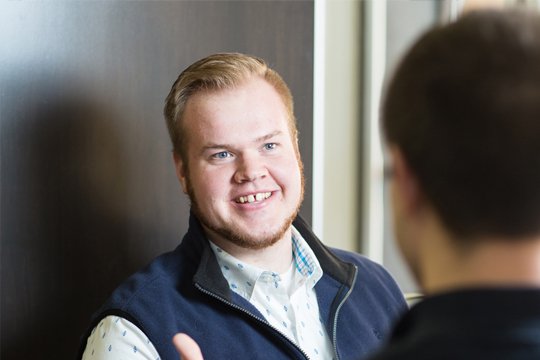
On a Friday morning in January, Joel Maier (’10) found himself at the bedside of a young girl who had been diagnosed with pneumonia.
At five years old, the child was admitted to C.S. Mott Children’s Hospital in Ann Arbor, Michigan, where Maier, 28, is employed as a certified child life specialist. The girl’s condition required that doctors insert a chest tube in order to drain the fluid that was filling her right lung.
With calming, patient tones, Maier stood alongside the child’s parents and explained the procedure that would soon take place. He gave the girl a chance to ask questions, and also helped her fix her eyes on things less daunting—a Katy Perry music video to watch during the procedure, and the opportunity to make a tie blanket when it was all over.
Knowing what to expect doesn’t take away the unpleasantness, but it can alleviate a great deal of fear, says Maier. And that can make all the difference when it comes to hospital visits.
“We understand being in the hospital is not a fun place to be,” Maier says. “My goal is to get to know the patient to teach them how to cope with the situation.”
Maier is a product of Concordia University Ann Arbor’s family life program, CUAA’s second-most-popular major, and one of only two universities in the Concordia University System to offer a program of its kind.
There are a limited number of universities nationwide that have an equivalent degree, and even fewer that boast as comprehensive a program as CUAA’s. Furthermore, Concordia offers the chance for continuing education—a Master of Science in Family Life Education— through its online program.
Within the family life undergraduate major, students have the opportunity to choose a minor, or a “field” they’d like to specialize in. There are the community services minors, who support children and families in public agencies and private, non-profit settings; the children’s ministry minors, who serve in a Christian ministry setting to strengthen and support parents and those who serve young children; the youth ministry minors, who serve young people in a church or community setting; and the child life specialists, like Maier, who support children and families during a medical intervention, crisis, or hospitalization.
Of the more than 80 students in the program, about two-thirds will work in non-faith-based work environments. For that reason, professors are intentional about helping students understand how to share their faith in secular settings, and employers have taken notice, says Family Life Program Director Dr. Steven Christopher.
“Employers know there’s a difference in a Concordia student,” says Christopher. “That difference is faith. I’d put money on that, because I know these students. I see their hearts, and I know that their motivation is a calling of the Spirit.”
Maier says hospital policies prevent him from being able to express his faith openly with patients, unless the conversation is first initiated by them, but he sees his work as an opportunity to share Jesus’ love in the way that he cares for and interacts with patients and their families.
“There’s often a lot of doubt in a hospital situation. The people there, in a sense, are lost,” Maier says. “When you’re in my position, you’re walking alongside of them through their experience and doing everything you can to show that even though this is super crappy, God has us.”
Learn more at: www.cuaa.edu/familylife.
— This story is written by Kali Thiel, director of university communications for Concordia University Ann Arbor and Wisconsin. She may be reached at kali.thiel@cuw.edu or 262-243-2149.
If this story has inspired you, why not explore how you can help further Concordia's mission through giving.